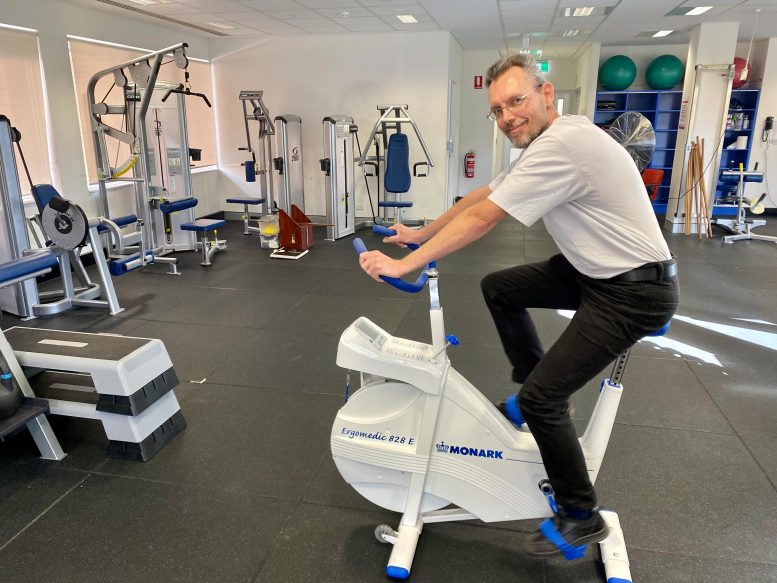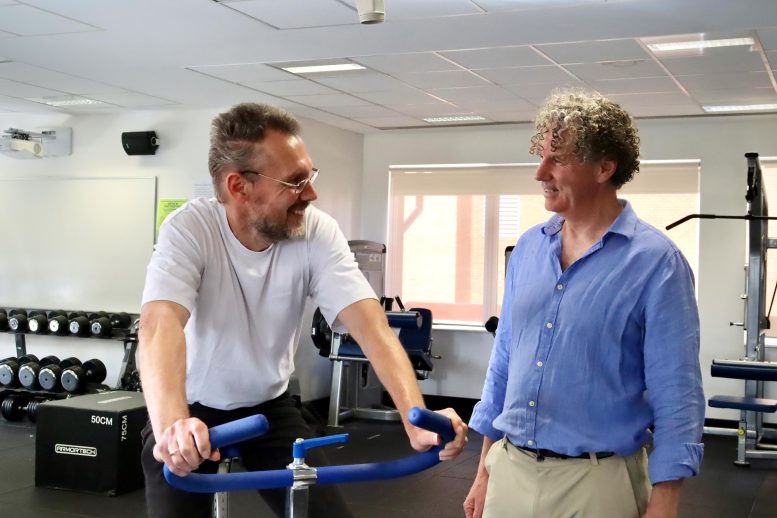
A new treatment for chronic back pain, called Cognitive Functional Therapy (CFT), has shown significant improvements in pain intensity and pain-related disability. The whole-person approach was tested on nearly 500 participants, who experienced large, clinically important reductions in pain and disability one year after the treatment.
In a study published in The Lancet, Cognitive Functional Therapy (CFT) showed significant improvements in chronic back pain sufferers, reducing pain intensity and disability while saving over $5,000 per person in healthcare and work productivity costs.
Long-term sufferers of chronic back pain experienced dramatic reductions in pain and related disability that remained at their one-year follow-up after taking part in a new treatment tested by Curtin-Macquarie-Monash University research. Published today in the leading medical journal The Lancet, the research found large clinically significant improvements in the intensity of pain and pain-related disability among almost 500 people who had been seeking help for their pain for an average of four years before trialing the new treatment.
The treatment, which delivered a healthcare and work productivity saving of more than $5000 per person, took a whole-person approach by also helping people to make lifestyle changes aimed at improving their social and emotional health.
Lead author Associate Professor Peter Kent, from the Curtin School of Allied Health, said the findings produced compelling evidence that the new treatment had a large and lasting impact at a “clinically important” level.

Retired mathematician Volker Rehbocks, a father of two, had been living with chronic back pain for at least 18 months. His GP told him that his gardening days were over, to avoid bending and lifting, gave him anti-inflammatories and advised him to rest his back. The constant pain and impact on his daily life left him feeling anxious and depressed. Mr. Rehbocks turned to the new treatment for help – and the difference has been life-changing. It only took about six to eight months to get his life back – he was quickly sitting comfortably, tying his shoelaces, bending, gardening, cleaning, working around the house and on his car, even lifting a cylinder head out of a car engine bay. Today, his mode of transport is rarely his car, opting to ride his bike large distances at a time with no pain. “My pain has effectively gone,” he said. Credit: Curtin University
“Lower back pain is the leading cause of disability across the globe, contributing to a loss of work productivity and early retirement worldwide,” Associate Professor Kent said.
“These exciting results give hope to the millions of people around the world who are disabled by back pain. It also provides a clear roadmap for clinicians, health services, and policymakers on how to reduce the growing burden of chronic back pain with a high-value, low-risk approach based on the best scientific evidence.”
The treatment, called Cognitive Functional Therapy (CFT), offered personalized and intensive coaching sessions that helped people make sense of their pain, focused on retraining them to move in ways that reduced their pain, and built confidence in movements and activities they had been afraid of or were avoiding. The treatment was delivered in 20 clinics across Perth and Sydney by 18 physiotherapists that were specifically trained to deliver CFT.
Participants living with chronic back pain – including many who had high levels of disability – tested the program in up to seven sessions over a 12-week period, followed by a booster session at six months. They were followed up by questionnaires until 12 months. More than 80 percent of the participants were satisfied with the treatment.

Trial participant Volker Rehbocks and Curtin Professor Peter O’Sullivan. Credit: Curtin University
Co-author Professor Peter O’Sullivan, also from the Curtin School of Allied Health, who developed the new treatment, said it put the patient at the center of care.
“This new treatment takes on board the individual characteristics of the person who has been living with chronic back pain by addressing their concerns and movement limitations under the skilled guidance of a trained physiotherapist,” Professor O’Sullivan said.
“This differs from traditional, more passive approaches – including massage, spinal manipulation, medication, and injections – because it puts the person in charge of their condition, helping them to understand the factors contributing to their pain, building control and confidence in their body to get back to valued activities. It was particularly rare and thrilling to discover that the significant reduction in pain and distress that these people living with chronic back pain experienced had remained right up to one year after trialing this new treatment.”
Co-author Professor Terry Haines, from Monash University, who investigated the economic efficiency, said the findings delivered significant healthcare and work productivity savings.
“The main economic efficiency results showed participants who took part in the CFT treatment saved more than $5,000 per person, largely driven by improvements in their productivity in both paid and unpaid work,” Professor Haines said.
“This has the potential to deliver significant savings to the global economy because we know the burden that lower back pain is contributing to a loss of work productivity and early retirement worldwide.”
Co-author Professor Mark Hancock, from Macquarie University, said the physiotherapists who carried out the new treatment across Perth and Sydney had experience in treating people with persistent lower back pain and underwent specialized training over five months to deliver the care set out in the new treatment.
“An important learning from our study was that it took quite a lot of training for physiotherapists to develop the skills and confidence to become competent to deliver the intervention at a high standard, despite the fact that many were already experienced,” Professor Hancock said. “The training included practice on real patients and receiving feedback from the trainers.”
Trial participant and retired mathematician Volker Rehbocks, a father of two, had been living with chronic back pain for at least 18 months. He first saw his GP who sent him for scans that showed degeneration and bone spurs.
His GP told him that his gardening days were over, to avoid bending and lifting, gave him anti-inflammatories and advised him to rest his back. He became progressively disabled and was struggling to do even the simplest daily activities like sitting or tying his shoelaces due to pain. He stopped doing all bending activities. Chiropractic manipulations had only given him a short-term reprieve before he eventually gave up.
The constant pain and impact on his daily life left him feeling anxious and depressed. “Chronic pain is very effective at sucking the joy out of life,” he said.
Mr Rehbocks turned to the new treatment for help – and the difference has been life-changing. It only took about six to eight months to get his life back – he was quickly sitting comfortably, tying his shoelaces, bending, gardening, cleaning, working around the house and on his car, even lifting a cylinder head out of a car engine bay. Today, his mode of transport is rarely his car, opting to ride his bike large distances at a time with no pain. “My pain has effectively gone,” he said.
Reference: “Cognitive functional therapy with or without movement sensor biofeedback versus usual care for chronic, disabling low back pain (RESTORE): a randomised, controlled, three-arm, parallel group, phase 3, clinical trial” by Peter Kent, PhD; Prof Terry Haines, PhD; Prof Peter O’Sullivan, PhD; Prof Anne Smith, PhD; Amity Campbell, PhD; Robert Schutze, PhD; Stephanie Attwell, PhD; J P Caneiro, PhD; Robert Laird, PhD; Kieran O’Sullivan, PhD; Prof Alison McGregor, PhD; Prof Jan Hartvigsen, PhD; Den-Ching A Lee, PhD; Alistair Vickery, MBBS and Prof Mark Hancock, PhD on behalf of theRESTORE trial team, 2 May 2023, The Lancet.
DOI: 10.1016/S0140-6736(23)00441-5
An international team of back pain experts, led by researchers from Curtin and Macquarie University in partnership with researchers from Monash University, the University of Limerick, Imperial College London, the University of Southern Denmark and The University of Western Australia conducted the research.
This study was funded by the National Health and Medical Research Council and Curtin University.









Great Post! Chiropractic care is generally considered safe when performed by a licensed and trained chiropractor. If you’re considering chiropractic care for chronic pain, it’s recommended to seek out a reputable and qualified practitioner and have a thorough discussion about your health history and treatment options.
“This groundbreaking research on Cognitive Functional Therapy (CFT) for chronic back pain is truly promising and offers fresh hope to millions of individuals suffering from this debilitating condition. The comprehensive approach of CFT, addressing not only physical symptoms but also focusing on patients’ social and emotional well-being, has delivered remarkable results. The significant reduction in pain intensity and disability, as well as the substantial cost savings in healthcare and work productivity, demonstrate the potential of CFT to revolutionize the treatment of chronic back pain.
What’s particularly inspiring is the patient-centered approach of CFT, empowering individuals to take control of their condition and understand the factors contributing to their pain. It’s heartening to see that these improvements are not short-lived but have a lasting impact, even up to one year after treatment. The dedication of the healthcare professionals involved in delivering CFT, along with their specialized training, highlights the commitment to providing the best care possible.
Chronic back pain is a global concern that affects both the quality of life and work productivity of countless individuals. The findings of this study not only offer hope to those in pain but also provide valuable insights for clinicians, health services, and policymakers. It’s clear that CFT has the potential to reduce the burden of chronic back pain and improve the overall well-being of patients.”